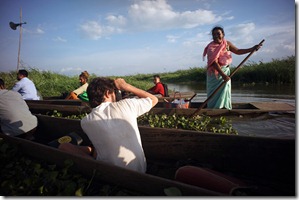Just a few days after crossing over the Tamu/Moreh border into Manipur, India, the shaky crew was invited to attend a World Environment Day (not sure if that’s a real thing) rally in the middle of Loktak Lake, outside of Imphal, the capital of Manipur.
Above: A possible insurgent leader, Mike, another big shot, Sarvesh, who is an architecture student in Mumbai, and yours truly.
We were invited by members of a local environmental and community advocacy organization, people who are also the members of the Manipur Bicycle Club, who were extremely helpful to us in our first hectic days in this new country. They drove us out to Loktak, which turned out to be quite different than expected.

For one thing, the lake is full of land. In the picture above, the grass and earth you see is actually floating in the middle of the lake. When you walk on it, it kind of bounces like a really heavy trampoline. So we walked out on the lake to these boats that then took us out onto the non-walkable part of the lake.



They then took us to a big floating island in the middle of the lake, about half an hour’s paddle from the “shore” where the rally was taking place. It was mostly really boring because it was just people talking forever in Manipuri, which I don’t understand. But the gist is this: Lake Loktak is in the midst of potentially becoming a UNESCO world heritage site because it harbors quite a few indigenous species, including a particular kind of crane, and a type of deer that eats the grasses on the floating islands. It is also, however, under threat. The government wants to open it to tourism (the bad kind, with concrete hotels lining the shores, and duck-shaped paddle boats for rent everywhere), and the military wants to use it as well (Manipur is still having separatist struggles with India). Pollution is also a big issue, as a lot of illegal dumping is happening in the area, a detriment to local fishermen’s traditional lifestyles. Visiting Loktak, though, you would never know any of this. It looks pristine, you can see fishermen in their traditional boats (which sit just inches above the water, and are barely wide enough for a person to wedge their but inside), and lots of houses on bamboo stilts built into the floating islands. Apparently, when fishermen return from a hard day’s work, they often have to ask their neighbors, “Hey where did my house go?” because the islands that serve as the foundation for their houses move around quite a bit during the day.


Aside from the unintelligible and interminable lectures, it was a pretty awesome experience, and we found out later that quite a few of the people there, advocating against the government and military on environmental grounds, might also have been part of the cross-border insurgency going on for the last several decades! Kind of cool/a little scary!
Above: A possible insurgent leader, Mike, another big shot, Sarvesh, who is an architecture student in Mumbai, and yours truly.
We were invited by members of a local environmental and community advocacy organization, people who are also the members of the Manipur Bicycle Club, who were extremely helpful to us in our first hectic days in this new country. They drove us out to Loktak, which turned out to be quite different than expected.

For one thing, the lake is full of land. In the picture above, the grass and earth you see is actually floating in the middle of the lake. When you walk on it, it kind of bounces like a really heavy trampoline. So we walked out on the lake to these boats that then took us out onto the non-walkable part of the lake.



They then took us to a big floating island in the middle of the lake, about half an hour’s paddle from the “shore” where the rally was taking place. It was mostly really boring because it was just people talking forever in Manipuri, which I don’t understand. But the gist is this: Lake Loktak is in the midst of potentially becoming a UNESCO world heritage site because it harbors quite a few indigenous species, including a particular kind of crane, and a type of deer that eats the grasses on the floating islands. It is also, however, under threat. The government wants to open it to tourism (the bad kind, with concrete hotels lining the shores, and duck-shaped paddle boats for rent everywhere), and the military wants to use it as well (Manipur is still having separatist struggles with India). Pollution is also a big issue, as a lot of illegal dumping is happening in the area, a detriment to local fishermen’s traditional lifestyles. Visiting Loktak, though, you would never know any of this. It looks pristine, you can see fishermen in their traditional boats (which sit just inches above the water, and are barely wide enough for a person to wedge their but inside), and lots of houses on bamboo stilts built into the floating islands. Apparently, when fishermen return from a hard day’s work, they often have to ask their neighbors, “Hey where did my house go?” because the islands that serve as the foundation for their houses move around quite a bit during the day.


Aside from the unintelligible and interminable lectures, it was a pretty awesome experience, and we found out later that quite a few of the people there, advocating against the government and military on environmental grounds, might also have been part of the cross-border insurgency going on for the last several decades! Kind of cool/a little scary!
